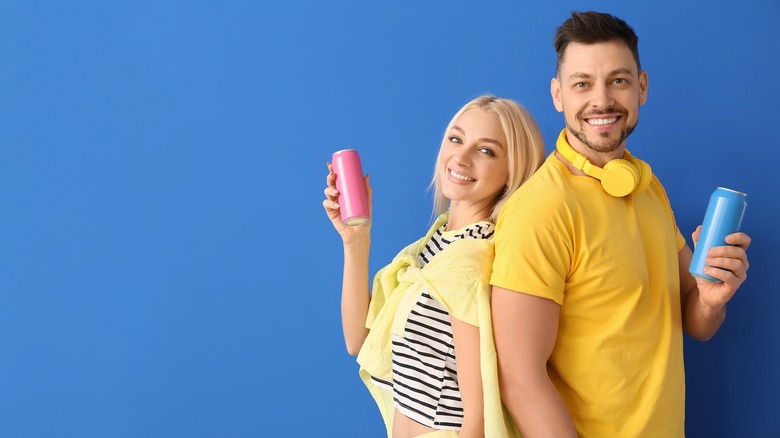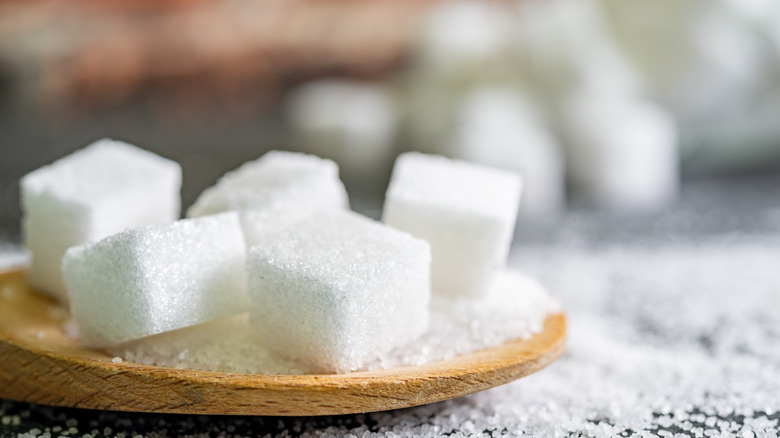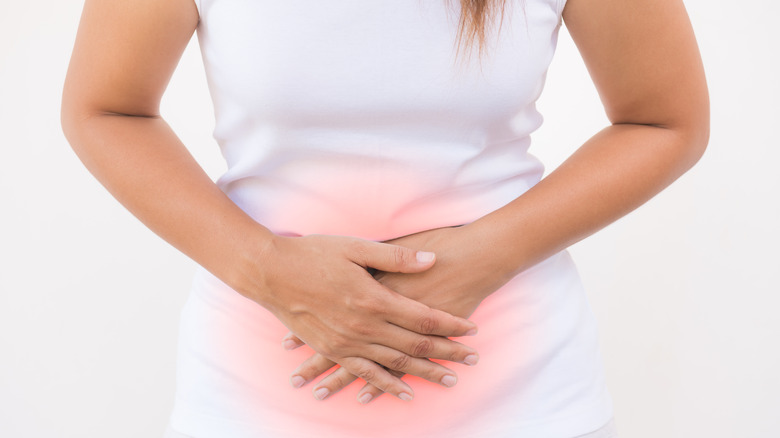Are Sugar Alcohol-Sweetened Foods Really Better For You Than Plain Sugar?
Scientific research is great at uncovering the potential health benefits and risks of all that we consume. With information resulting from such research just a keyboard click away, this is truly the age of enlightened consumerism.
Eating too much sugar does a lot of things to your body. Excessive sugar intake has been linked to Type 2 diabetes, obesity, and heart disease, per Harvard Medical School, all of which negatively impact quality of life. The concern mainly lies with added sugar rather than naturally-occurring sugar found in fruits, grains, and vegetables (via New Scientist). In fact, the Dietary Guidelines for Americans 2020-2025 recommends limiting added sugar intake to lower than 10% of total daily calorie consumption.
Whether you're conscious of health conditions or you're simply trying to cut back on sugar, you might find yourself reading the food labels at the supermarket a lot more closely. In your search for sugar substitutes, you may have come across terms like xylitol, erythritol, and maltitol, otherwise known as sugar alcohols (via Healthline). Sugar alcohols are an alternative to sugar. They're found in products like candies, gum, processed foods, and even toothpaste. They're not the same as artificial sweeteners but perform the similar task of adding flavor to foods, reports Yale New Haven Hospital. Are foods sweetened by sugar alcohol a better option than plain sugar?
Sugar alcohol is better than plain sugar
The name "sugar alcohol" is confusing, according to dietician Tegan Bissell, as the food doesn't contain sugar or alcohol (via Cleveland Clinic). However, it is a healthier alternative to consuming plain sugar, especially for people trying to maintain healthy blood glucose levels. They're not absorbed fully by our bodies the way regular sugar is.
Sugar alcohols are essentially a form of carbohydrate that are manufactured, although some come from natural foods. They have fewer calories — 2 per gram — than plain sugar, which has 4 per gram. "They taste almost as sweet as sugar with about half the calories," explains Bissell. In addition to being a safe low-calorie sweetener option for those with diabetes, sugar alcohols are also lower than plain sugars on the glycemic index, per Healthline. "... [They] may cause only a slight rise in blood sugar levels," according to Bissell, again making them a better choice for those with diabetes, per Cleveland Clinic.
Dental issues like tooth decay are common side effects of consuming plain sugar, and sugar alcohols are considered safer, if not beneficial alternatives. A 2016 study published in the International Journal of Dentistry found that the sugar alcohol erythritol might even help prevent dental cavities. This might explain why toothpaste labels will tell you they have sugar alcohol in them (via Healthline).
Excess consumption of sugar alcohols can cause problems
As with anything, moderation is key, even with sugar alcohol-sweetened foods. The recommended daily intake is about 10 to 15 grams, reports Cleveland Clinic. Anything more could have damaging effects like weight gain, gastrointestinal issues, and purging. Because sugar alcohols aren't absorbed as easily as regular sugar, they can cause some discomfort such as gas, bloating, and nausea when taken in uncontrolled amounts. Also, just because these artificially-manufactured sweeteners have fewer calories, they're not completely absent of them, unlike artificial sweeteners which have zero calories. This means that you can still gain weight if you excessively consume foods laced with sugar alcohol. Sugar alcohols are also known to cause a "laxative effect," making them less than ideal choices for people with existing G.I. issues (via University of Maryland Medical System).
Although considered safe for those with diabetes, this may not always be the case if you don't take your overall intake of carbohydrates into account, per University of Maryland Medical System. Your glucose levels can be negatively impacted if you don't pay attention to the labels on sugar alcohol-sweetened foods and see just how much are in the foods you're consuming. Coupled with the carbohydrates you're getting from other sources, you can easily go over the recommended amount.
Sugar alcohols have their merits, especially when consumed within the approved quantities. In addition to being safer for those with diabetes, they might even be a good way to go if you're contemplating trying a sugar detox.


